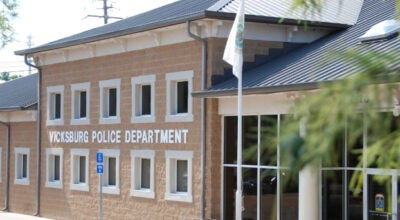Natural gas prices begin assault, trickle-down
Published 12:00 am Friday, January 5, 2001
U.S. Rubber Reclaiming Inc. worker Michael Louis loads rubber chips into a digester that runs off steam produced by a natural gas boiler Thursday. Natural gas prices have more than doubled at the rubber plant this month. (The Vicksburg Post/MELANIE DUNCAN)
[01/05/01] Although customers of the City of Vicksburg’s natural gas service have yet to see any rate increases related to higher costs, industrial consumers with direct supplies say they’re being hit hard.
One of the largest users of natural gas in the area is Entergy which has six gas-fired plants making electricity in Mississippi, including the Baxter Wilson plant in Vicksburg.
“Natural gas prices have gone up tremendously in the past year,” said Checky Herrington, a spokesman for Entergy.
He said the utility buys gas in units of million BTUs. At the beginning of 2000, Entergy was paying about $2 per million BTUs but now the company is having to pay almost $10 per million BTUs.
“That is a significant increase,” he said. “And it is not just us. It affects utilities across the nation.”
The charge is being passed through to electric customers, but Herrington said Entergy has worked out an arrangement so it can spread the fuel cost increase over 24 months. Instead of hitting customers with a 31 percent increase with the bills they will receive at the end of January, the increase will be 9 percent with more fuel cost increases added in later calendar quarters.
Herrington also reminded some customers, particularly those who heat with electricity, some of the increases they have seen and will see are due to increased usage because of the extremely cold weather this winter.
For rising bills from the City of Vicksburg, the weather and the automatic repeal of a small one-year price reduction are what’s causing higher bills. Although Mayor Robert Walker said it would “be irresponsible to do nothing,” the city’s rates have not been changed to reflect a nearly three-fold increase in the price it is paying suppliers of gas. Where gas cost the city $1.98 per thousand cubic feet in December 1999, it cost $5.86 last month. City gas rates are set by ordinance and, at least publicly, no changes have been made.
Elsewhere, both U.S. Rubber Reclaiming and International Paper Company here have seen their bottom lines affected by the increase in the cost of natural gas.
“We use some to heat a boiler to make steam to cook our rubber,” said Don LaGrone, president of the company on U.S. 61 South that recycles rubber from used tires.
He said the normal monthly bill jumped from about $4,000 a month to more than $9,000 a month.
He also said the increase cost of gas has affected his electric costs.
“When you use $100,000 worth a month, a 10 or 15 percent increase is significant,” LaGrone said.
One of the significant problems the increased cost of production causes U.S. Rubber Reclaiming is they can’t immediately pass on the increases to their customers. They are suppliers to some of the major tire manufacturers in the country and the sales are based on contracts that are usually negotiated annually.
“We have to absorb the increase until it’s time to renegotiate,” he said.
At the IP plant, the natural gas costs are about four times what they were a year ago, said Brad Biggar, mill manager. The local mill makes kraft linerboard used in the manufacture of corrugated cardboard shipping cartons.
“We have had to rely more on alternative fuels,” he said.
Those fuels include cotton seed, bark from the wood they use, black liquor that is a byproduct of the papermaking process and fuel oil.
But, he said, using those alternative fuels can only partly offset the increases in natural gas, the mill must still use a certain amount.
“It definitely affects our cost per ton” of kraft linerboard, he said.
John Miles of Vicksburg Chemical said the price of gas is affecting their cost structure, but not as badly as it could.
“I bought gas futures in September,” he said, adding that has allowed the local fertilizer plant to work with an increase in gas prices of only double that of this time last year instead of four or five times.
He also said Vicksburg Chemical has been able to stay open when some of its colleagues have found it more profitable to shut down plants and sell their gas allocations.
Vicksburg Chemical uses natural gas to generate steam to heat chemical processes and to generate heat for product drying.





